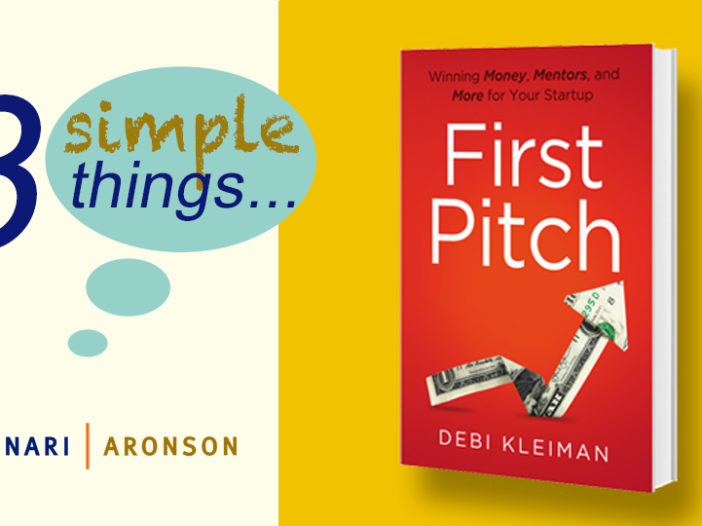
Debi Kleiman is the executive director of The Blank Center for Entrepreneurship at Babson College, a former marketing executive, and author of the forthcoming book: First Pitch: Winning Money, Mentors, and More for Your Startup.
First Pitch is your first book—why did you write it?
In my role at Babson, I work with so many early stage entrepreneurs. Time after time they say how much they dread pitching and feel overwhelmed by the process. Information is scattered and in bite-sized pieces, that’s hard to use if you don’t have an organizing framework for how to move through it. It shouldn’t be something to dread – it should be something exciting! You are getting to tell the world about what you are building and inviting them to join you on the journey.
I wanted to take some of the angst out of the process by providing really concrete ways to create a compelling and memorable pitch, but also delve into the other dynamics around pitching that are so important – demonstrating the right interpersonal skills, proving your coachability, building relationships, and understanding your audience.
The book is an all in one resource for entrepreneurs that not only gives them an inside look at the process but also gives them ways to take action right away to begin mastering their pitch and other startup communication skills.
What makes for a “perfect pitch”?
Storytelling – people love stories, in fact, our brains are wired to remember stories so bringing your pitch alive with storytelling is important. Not only does being memorable matter to get people interested in helping you, but it also helps them tell your story to others who might be helpful, so it creates a ripple effect. Storytelling also puts people in listening mode vs sharing data and dry information puts them in evaluation mode, judging the idea and looking for errors.
Making an emotional connection with the audience – odds are that your business has a unique value proposition (it’s special sauce), and the stronger the unique value proposition, the higher the success rate. Many times this is about meeting an emotional or social need for a consumer, that maybe they didn’t even know they had. Using words that convey emotion or establishing an emotional connection with your audience can create magnetic energy that people can’t ignore, they just are compelled to jump in with you.
Using simple, direct language – no jargon or buzzwords. People don’t want to listen to a bunch of empty words that are just trying to hang onto a trend. You should be able to describe what you do in the simplest terms so that your grandma or your 12 year old nephew can get it.
Level up the pitch to something inspiring. Show that even in these early stages you have big ambitions and want to make an impact or start a movement. I’ve found that entrepreneurs constantly think too small, they need to have bold ideas that make people’s eyes widen and their pulse quicken.
It’s not just the pitch itself, the Q&A following the pitch or the conversation with an investor after your formal presentation is just as important. They want to know that you are coachable, open, trustworthy and truly understand the details of the industry. You are likely to get some negative feedback, don’t get emotional or defensive, instead use a catch phrase (“that’s interesting, let’s dig into that…”) that reminds you that this feedback, however harsh, is helping you learn and make the business better.
And last, never ever go into a pitch without researching the people you are pitching to. Learn about them as people, on a personal level if you can, but most definitely learn about what motivates them in business and what really lights their fire so you can tap into it.
In this tumultuous period, what pitch adjustments should entrepreneurs and innovators be doing now to attract funding and launch a product or service?
Demonstrate you are being thoughtful about pivoting your business model to be relevant in a COVID-19 world, not only short term but longer term, when the world will likely be really different.
Show that you have in-depth understanding of your customer. This is true always, but now more than ever having great insight into how your customer thinks and what they want is a massive competitive advantage.
Have really sound financials, show how you can weather the storm and make a little money go a long way.
Demonstrate that your business is a “pill” rather than a “vitamin” – it should be based on a pain that absolutely needs to solved, a necessity – not a nice to have.
Be ready to pitch in a virtual environment, and use the time to build a relationship. Investors often feel compelled to invest because of a connection to the founder or the founding team as well as the business idea. Find ways to reveal the kind of partner you can be and show that working with you will be a rewarding experience. Even if they don’t invest in you, there might be other ways they can help if they’re excited about you and the business.




